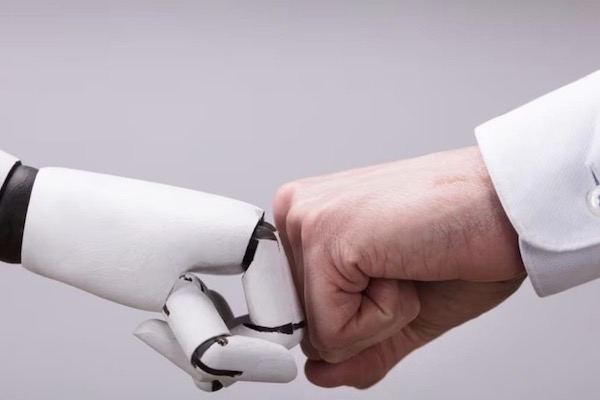Published on the 06/08/2025 | Written by Heather Wright

But human still beats AI…
AI and software innovation are enhancing revenue growth, delivering measurable ROI and increased productivity, according to the c-suite, but long-term success hinges on human expertise, governance and strategic alignment.
A Harris Poll survey of nearly 2,800 executives globally – carried out for GitLab – has the executives talking up software innovation’s role as the new economic growth engine, with 91 percent saying it’s now a core business priority.
“73 percent believe human input should be at least 50 percent in human-AI partnerships.”
Among the most common metrics for software innovation success were increased business growth, improved problem solving and enhanced developer productivity, rather than traditional metrics like code volume. Fifty-eight percent of the executives reported business growth tied to software innovation over the last 12 months.
The report suggests they’re also putting their money where there mouth is, stumping up with ‘meaningful’ investment in software development over the past 12 months.
As for AI, well the executives – who included 259 in Australia but none in New Zealand – credit ‘AI-enhanced innovation’ over the past year with providing their businesses with an estimated 44 percent revenue increase with AI providing a 48 percent increase in developer productivity.
Those developer time savings are bringing benefits to bare, with companies are reporting saving more than $28,000 a year thanks to their AI investments (bearing in mind that GitHub is, of course a DevSecOps platform). The business leaders estimate developers have saved 943 hours – or 117 business days – over the past year thanks to AI software innovation investments.
The report also highlights that strategic deployment, rather than experimentation, is moving into the norm. Just 10 percent say they’re in the experimental/pilot phase, with 11 percent admitting to tactical quick fixes without a broader strategic AI roadmap. In comparison, 34 percent say they are combining strategic AI investments with targeted implementations to improve long-term outcomes and near-term efficiency, and quarter are integrating AI across multiple functions for competitive advantage. For 17 percent software and AI innovation are now embedded in how their business operates and grows.
But AI isn’t having it all its way, with 73 percent believing human input should be at least 50 percent in human-AI partnerships. In reality, humans are currently still doing most of the heavy lifting with AI accounting for just 25 percent of the work currently.
“This disconnect exists alongside persistent concerns about job displacement, the perceived complexity of AI systems, and cybersecurity,” GitLab says.
The human edge is most valued for creativity and strategic input for software innovation, with 99 percent of executives saying human contributions are valuable. Collaboration, innovation, adaptability, communication, empathy and ethics were also valued.
Ask the executives whether AI tools or humans contribute more to developer productivity and they’re fairly evenly split: 62 percent say it’s AI tools that provide a significant productivity improvement. For 58 percent, it’s the talent of their engineers.
That human element however, is feeling the squeeze with 28 percent saying cost savings are prioritised over high-value engineering talent. In some good news, however, the largest group – 37 percent – believe they’re striking a balance approach, recognising cost management is important, but investing in talent in recognition that it is also critical for long-term success and innovation. And the remainder are prioritising engineering talent over cost efficiencies.
With that in mind, upskilling is being treated as a strategic investment, rather than an overhead
The executives are also eyeing an agentic future to bring even bigger benefits, with 89 percent expecting it to become the industry standard for software development within three years and the majority believing agentic AI will provide a distinct competitive advantage and foster creativity and innovation among software development teams.
Again though, the majority see agentic as an adjunct to humans, believing there are essential human qualities that the technology will ‘never fully replace’.
But if AI brought challenges, agentic is set to mirror and magnify them with cybersecurity, data privacy and security and maintaining governance key concerns. Eighty-five percent say agentic will create ‘unprecedented’ security challenges for their organisation to navigate.
AI agent introduced errors, ethics and transparency and ROI uncertainty rounded out the list of key concerns.
Bill Staples, GitLab CEO, says the companies pulling ahead are the ones blending AI with human expertise, leveraging agentic AI with intention, aligning software strategy with business value and building guardrails to innovate responsibly.



























